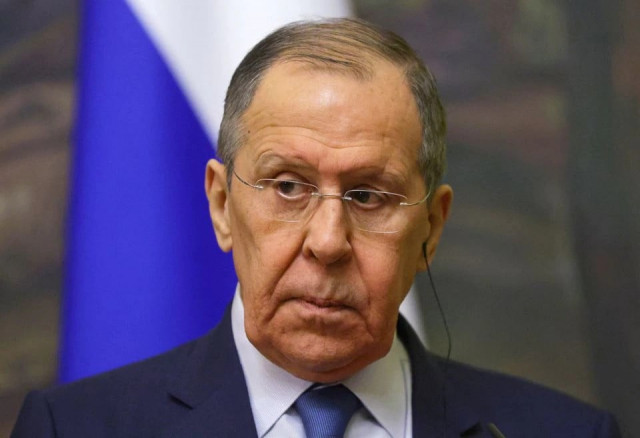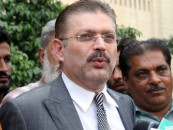Russia urges diplomacy to douse Indo-Pak tension
Lavrov calls for settling discords through talks; Turkiye, Switzerland & Greece back Pak probe call

Russia on Saturday joined the global chorus of calls for India and Pakistan to douse simmering tensions sparked by the deadly Pahalgam rampage as Pakistani leaders reached out to more world leaders in their ongoing diplomatic push to deescalate the situation.
Russian Foreign Minister Sergey Lavrov rang up his Indian counterpart S Jaishankar to discuss simmering tensions which threaten to trigger military hostilities between the two arch-nemeses.
"They discussed issues of Russian-Indian cooperation and the aggravation of Indian-Pakistani relations following the terrorist attack in Pahalgam," India's ANI reported quoting a Russian foreign ministry statement.
"Sergey Lavrov called for settling disagreements between New Delhi and Islamabad on a bilateral basis by political and diplomatic means per the provisions of the Simla Agreement of 1972 and the Lahore Declaration of 1999," it added.
Lavrov's call came a day after EU foreign policy chief Kaja Kallas telephoned Foreign Minister Ishaq Dar and Indian External Affairs Minister Jaishankar to "urge both sides to show restraint and pursue dialogue to ease the situation". US Vice President JD Vance also said that his country hoped India's response to the Pahalgam incident "does not lead to a broader regional conflict."
Despite its historically warm ties with India, dating back to the Cold War era, Russia's emphasis on diplomacy hints at caution as New Delhi's tilt toward Washington fails to pay off.
While top US leaders, including President Donald Trump, strongly condemned the attack, labelling it "terror" and "unconscionable", they stopped short of explicitly pointing finger at Pakistan. Unlike past administrations that readily invoked the "nuclear flashpoint" rhetoric over Kashmir, Trump's lukewarm remarks also suggested a notable cooling of urgency.
India's diplomatic push lost further steam as it struggled to publicly offer evidence to substantiate its allegation of Pakistan's involvement in the Pahalgam killings. The lack of tangible proof cast a long shadow of doubt, and what New Delhi had hoped would be a rallying cry instead became a whimper.
Meanwhile, Islamabad has been working the phones, reaching out to friendly states and Western nations, making sure its side of the story is registered as India weaponises the Indus Waters Treaty. On Saturday, Prime Minister Shehbaz Sharif reiterated Pakistan's demand for a neutral investigation, accusing India of hurling baseless allegations.
During a meeting with the ambassador of the Republic of Turkiye, Dr Irfan Neziroglu, the premier stressed Pakistan's consistent and principled condemnation of terrorism "in all its forms and manifestations", according to a statement issued by his office.
"India has yet to respond to Pakistan's offer to have a credible, transparent and neutral international investigation to ascertain the facts behind the Pahalgam incident," he said, asserting that Pakistan was fully prepared to cooperate with such an inquiry and would "welcome if Turkiye joined it".
PM Shehbaz also expressed gratitude to President Recep Tayyip Erdogan for his "strong statement that supported Pakistan during the prevailing situation in South Asia" and his consistent call for peace in the region.
The Turkish envoy conveyed Ankara's appreciation for Pakistan's principled position and reiterated Turkiye's solidarity. He also advocated for restraint and de-escalation, underlining the importance of preserving peace in South Asia.
Deputy Prime Minister and Foreign Minister Ishaq Dar, meanwhile, spoke to his Greek counterpart George Gerapetritis by the phone and briefed him on the evolving situation, rejecting what he described as India's "baseless allegations, disinformation campaign and illegal unilateral measures" that, he warned, were imperiling peace in the region.
"He [FM Dar] strongly condemned India's unilateral decision to hold the Indus Waters Treaty in abeyance - a blatant violation of its international obligations," the Foreign Office said in a statement. Dar also urged the need for an "independent and transparent investigation to establish the facts".
FM Gerapetritis acknowledged the dangers of escalation, backed Pakistan's proposal for a neutral probe, and underlined the need for diplomatic restraint. The two leaders also agreed to maintain close coordination on regional issues and global forums, particularly at the UN Security Council, where both serve as non-permanent members.
In another key outreach, FM Dar spoke with Swiss Federal Councillor and Foreign Minister Ignazio Cassis to apprise him of the deteriorating security environment, "expressing grave concern over India's recent provocative actions, including baseless allegations, inflammatory propaganda, and its unilateral decision to hold the Indus Waters Treaty in abeyance — an outright violation of international legal obligations," according to a Foreign Office press release.
FM Dar reiterated Pakistan's call for a credible international investigation and assured that Islamabad remained committed to exercising restraint, without compromising on its sovereign rights or national interests.
FM Cassis lauded Pakistan's measured approach, endorsed the investigation proposal, and offered Switzerland's "good offices" to facilitate a fair and impartial process. Both sides agreed to remain in close consultation as the crisis unfolded.

























COMMENTS
Comments are moderated and generally will be posted if they are on-topic and not abusive.
For more information, please see our Comments FAQ